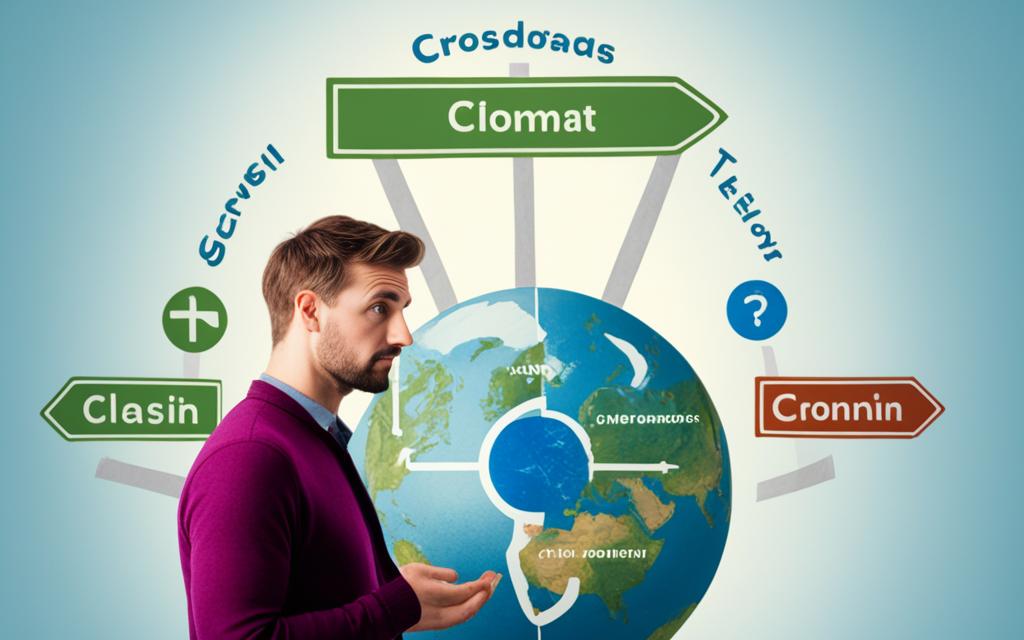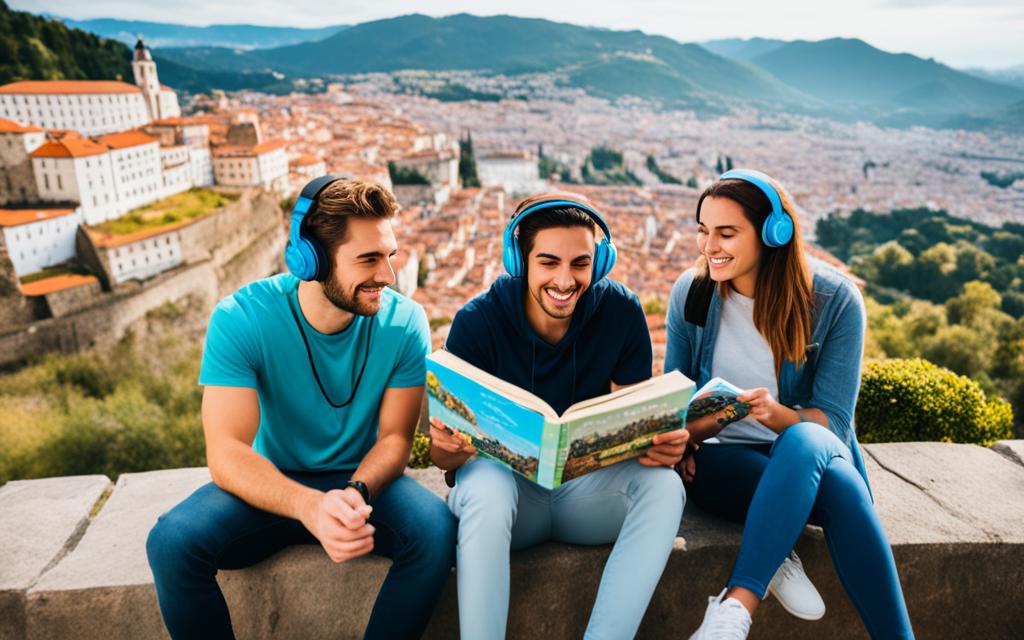Embark on a transformative language education journey and explore the power of language learning in broadening horizons. In this section, I will share my personal journey and highlight the impact of language education on personal growth and cultural understanding.
Key Takeaways:
- Language education has the potential to transform individuals by expanding their horizons and fostering cultural understanding.
- Personal growth and development can be achieved through language acquisition and proficiency.
- Language learning opens doors to new opportunities in both personal and professional spheres.
- A language education journey involves overcoming challenges and adapting to effective language learning strategies.
- The transformative power of language immersion experiences cannot be underestimated.
The Genesis of My Language Education Journey
Embarking on a transformative language education journey requires a spark of inspiration and a desire for personal growth. For me, this journey began with a myriad of factors that shaped my interest in learning new languages.
As a child, I was fascinated by the beauty and diversity of different languages. Hearing people speak in unfamiliar tongues sparked a sense of curiosity within me, igniting a passion for language learning. Additionally, growing up in a multicultural environment exposed me to various cultures and languages, further fueling my desire to explore the world through language education.
Moreover, personal motivations played a crucial role in initiating my language education journey. I recognized that acquiring new languages would not only enhance my communication skills but also broaden my horizons, allowing me to connect with individuals from diverse backgrounds on a deeper level.
All of these factors converged to form the genesis of my language education journey, setting the stage for a transformative experience that would shape my perspectives and open doors to new opportunities.
Learning new languages opens the door to new cultures and perspectives, fostering personal growth and connection.
Language Learning: A Gateway to Cultural Diversity
Language learning is not simply about acquiring new words and grammatical structures; it is also a powerful tool for accessing and understanding diverse cultures. By embarking on a journey of language education, individuals open themselves up to new perspectives, traditions, and ways of life. This section explores how language learning serves as a gateway to cultural diversity, enabling connections between individuals from different backgrounds.
Finding Common Ground through Language Skills Development
As language learners delve into the intricacies of a new language, they also develop a deeper appreciation for the cultures associated with it. By understanding the nuances of a language, learners gain insight into the values, beliefs, and customs of the people who speak it. This understanding fosters empathy and creates opportunities to find common ground, fostering connections between individuals who may otherwise be separated by cultural barriers.

Language skills development plays a crucial role in bridging cultural gaps. As learners become more proficient in a language, they gain the ability to communicate effectively with native speakers, engaging in conversations that transcend linguistic boundaries. Through active participation in the language and culture, learners can overcome misunderstandings, build trust, and establish meaningful connections with individuals from diverse backgrounds.
Language Proficiency: Bridging Cultures and Fostering Connections
Language proficiency is a key factor in unlocking the full potential of cultural diversity. Achieving fluency in a language allows individuals to fully immerse themselves in another culture, breaking down barriers and forming deep connections. Proficient language skills enable individuals to navigate different cultural contexts, facilitating meaningful interactions and fostering cross-cultural understanding.
With language proficiency, individuals can engage in authentic conversations, appreciate literature and art, and fully embrace the traditions and customs of a particular culture. By mastering a language, learners gain a deeper appreciation for the nuances and subtleties that define a culture, leading to a greater understanding and respect for cultural diversity.
Language learning not only broadens horizons but also enriches lives by fostering connections with people from diverse cultures. Through the development of language skills and achieving language proficiency, individuals can bridge cultural gaps, find common ground, and embrace the beauty of cultural diversity.
Choosing the Right Language Education Programs
When it comes to embarking on a language education journey, selecting the right programs is crucial for success. It is essential to align the language education curriculum with personal goals to ensure a meaningful and fulfilling learning experience. Additionally, evaluating language immersion programs for immersive experiences can significantly enhance language acquisition and cultural understanding.
Aligning Language Education Curriculum with Personal Goals
In order to maximize the benefits of language education programs, it is important to choose a curriculum that aligns with personal goals. Whether the aim is to learn a language for career advancement, cultural enrichment, or personal interest, a well-designed curriculum can make all the difference. Look for programs that offer a comprehensive and structured approach, including grammar, vocabulary, conversation practice, and cultural insights.
An effective language education curriculum should cater to different learning styles and provide a balance between theoretical knowledge and practical application. It should also incorporate opportunities for real-life communication through role-plays, group discussions, and interactive exercises. By aligning the curriculum with personal goals, learners can stay motivated and engaged throughout their language education journey.
Evaluating Language Immersion Programs for Immersive Experiences
Language immersion programs offer a unique opportunity to immerse oneself in the target language and culture, facilitating faster language acquisition and a deeper understanding of the language. When evaluating language immersion programs, consider the following factors:
- Program Duration: Determine the length of the program and assess whether it aligns with the desired level of language proficiency.
- Language Intensity: Evaluate the intensity of language instruction and the extent to which it promotes immersive experiences.
- Cultural Activities: Look for programs that provide a rich cultural immersion experience, including excursions, cultural workshops, and interactions with native speakers.
- Language Support: Ensure that the program offers adequate language support, such as language tutors, conversation practice, and feedback sessions.
By carefully evaluating language immersion programs, learners can choose experiences that not only enhance their language skills but also provide meaningful cultural immersion and a transformative learning journey.
| Important Factors to Consider when Choosing Language Education Programs | Language Education Curriculum | Language Immersion Programs |
|---|---|---|
| Alignment with Personal Goals | ✔️ | ✔️ |
| Comprehensive and Structured Approach | ✔️ | ❌ |
| Real-life Communication Opportunities | ✔️ | ❌ |
| Language Intensity and Immersive Experiences | ❌ | ✔️ |
| Cultural Activities and Interactions | ❌ | ✔️ |
| Language Support | ❌ | ✔️ |
The Transformative Power of Language Immersion
Language immersion experiences have the remarkable ability to transform our language acquisition and deepen our cultural understanding. Through immersive programs, individuals have the opportunity to fully immerse themselves in the target language, creating an environment where language learning becomes a natural part of daily life.
Personally, I have witnessed the transformative power of language immersion firsthand. During my time studying abroad in France, I enrolled in a language immersion program that allowed me to live with a host family and attend classes conducted entirely in French. This complete immersion in the language enabled me to rapidly improve my language skills and gain a deeper understanding of the French culture.
The transformative nature of language immersion lies in its ability to push us outside of our comfort zones. In an immersive environment, we are constantly challenged to communicate in the target language, whether it be ordering a meal at a local restaurant or engaging in conversations with native speakers. These real-life interactions not only foster linguistic growth but also enhance our cultural fluency and intercultural competence.
Moreover, language immersion experiences provide us with a unique perspective on the world. By immersing ourselves in a different linguistic and cultural context, we gain a deeper appreciation for diversity and the interconnectedness of global communities. This perspective broadens our horizons and equips us with the skills needed to navigate a multicultural and interconnected world.
In conclusion, language immersion experiences have the power to transform our language acquisition and cultural understanding. Through complete immersion in the target language, individuals can rapidly improve their language skills and gain a holistic understanding of the culture. These experiences push us outside of our comfort zones and expand our perspectives, enabling us to navigate a diverse and interconnected world with ease.
Language Acquisition: Challenges and Triumphs
When embarking on a language education journey, one cannot overlook the challenges that come along the way. Language acquisition, though rewarding, is not without its difficulties. However, with perseverance and effective strategies, these obstacles can be overcome, leading to triumphs in language fluency development. In this section, I will discuss the challenges I encountered during my own language acquisition process and the strategies I employed to overcome them.
Overcoming Obstacles in Language Fluency Development
Throughout my language education journey, I faced various hurdles that impeded my progress in language fluency development. Some of the common challenges include:
- Vocabulary Acquisition: Learning an extensive vocabulary can be daunting, particularly in languages with complex word structures and diverse idiomatic expressions. Memorizing words and phrases requires dedication and consistent practice.
- Grammar Complexity: Understanding and applying complex grammatical structures can be challenging. The rules and exceptions inherent to a language can be overwhelming at times, requiring patience and focused study.
- Pronunciation: Mastering the correct pronunciation of sounds and tones is crucial for effective communication. Pronouncing words incorrectly can sometimes lead to misunderstandings and misinterpretations.
- Cultural Context: Language is deeply intertwined with culture. Understanding the cultural nuances and context embedded within a language can pose challenges for language learners.
Despite these challenges, I refused to be discouraged. Instead, I adopted effective language learning strategies and tailored them to my personal needs.
Effective Language Learning Strategies and Personal Adaptations
Language learning is a highly individualized process that requires personalized strategies and adaptations. Here are some strategies I found effective in overcoming the challenges of language acquisition:
- Immersive Experiences: Engaging in immersive experiences, such as living or studying in a country where the target language is spoken, provides an invaluable opportunity to practice and improve language skills in real-life contexts.
- Regular Practice: Consistency is key in language learning. Dedicate regular time to practice reading, writing, listening, and speaking in the target language. This can be achieved through activities like journaling, watching movies or TV shows, and participating in language exchange programs.
- Utilizing Language Learning Resources: Take advantage of language learning resources such as textbooks, online courses, language apps, and language exchange platforms. These resources provide structured learning materials and opportunities for interactive practice.
- Seeking Language Partners: Connecting with native speakers or individuals fluent in the target language can greatly enhance language fluency development. Engaging in conversations and receiving feedback from language partners can accelerate progress.
- Taking Breaks: While consistent practice is important, it is equally crucial to give oneself breaks to avoid burnout. Taking breaks allows the brain to process and assimilate the newly acquired language skills.
By implementing these strategies and adapting them to my specific circumstances, I was able to overcome the challenges I faced during my language acquisition journey. These personal adaptations played a significant role in my language fluency development and ultimately led to triumphs in my linguistic abilities.

| Challenge | Strategy |
|---|---|
| Vocabulary Acquisition | Memorization techniques, flashcards, and consistent practice |
| Grammar Complexity | Systematic study of grammar rules, focus on problem areas, and seeking clarification from language instructors or native speakers |
| Pronunciation | Listening to native speakers, mimicry, and regular pronunciation exercises |
| Cultural Context | Immersing myself in the culture, engaging with native speakers, and seeking cultural explanations |
Language Education Journey: Impact on Personal and Professional Life
Embarking on a language education journey has a profound impact on both my personal and professional life. The acquisition of language proficiency opens up a world of possibilities in various settings, from personal relationships to career opportunities and global communication.
Language education equips me with the skills to form deeper connections with individuals from different cultural backgrounds. It enhances my ability to understand and appreciate diverse perspectives, bridging gaps and fostering mutual understanding. By developing language proficiency, I am able to find common ground and forge meaningful connections that transcend linguistic and cultural barriers.
In my personal life, language education enriches my relationships by allowing me to communicate more effectively with family, friends, and loved ones who speak different languages. It enables me to connect on a deeper level, share experiences, and engage in cultural exchanges. Through language learning, I am able to navigate new environments, understand different traditions, and embrace diversity.
Professionally, language proficiency opens up a multitude of career opportunities in an increasingly globalized world. It allows me to communicate with international colleagues, clients, and partners, expanding my network and enabling collaborations on a global scale. Language education enhances my cross-cultural communication skills and demonstrates my adaptability and cultural sensitivity, making me a valuable asset in diverse work environments.

Language education is not only about acquiring language skills but also about personal growth and self-discovery. It broadens my horizons, challenges me to step out of my comfort zone, and provides a deeper understanding of the world around me.
Overall, my language education journey has had a transformative impact on both my personal and professional life. It has enriched my relationships, expanded my career opportunities, and deepened my cultural understanding. Language proficiency is a powerful tool that allows me to connect, communicate, and thrive in an increasingly interconnected global society.
Expanding Horizons: Language Study Abroad Experiences
Studying language abroad offers a transformative experience that goes beyond language acquisition. It provides an opportunity to immerse oneself in a new culture, explore unfamiliar surroundings, and make lifelong connections with people from around the world. Whether it’s for a few weeks, a semester, or a full academic year, language study abroad opens doors to new horizons and broadens perspectives.

Adventures in Global Communication: Unlocking New Worlds
Language study abroad is not just about learning grammar and vocabulary; it’s about using language as a tool for meaningful communication. When studying abroad, you’ll have countless opportunities to practice your language skills in real-life situations, from ordering food at a local market to making new friends from different cultural backgrounds. These adventures in global communication allow you to see the world through a new lens and develop a deeper understanding of the people and cultures you encounter.
The Role of Language Education Resources in Enhancing Abroad Experiences
To make the most of your language study abroad experience, it’s crucial to have access to high-quality language education resources. These resources can include textbooks, online language courses, language exchange programs, and language learning apps. They provide valuable support in the language learning journey, helping you strengthen your language skills and gain confidence in your ability to communicate effectively. By leveraging these resources, you can enhance your study abroad experience and maximize the benefits of immersion in a foreign language environment.
Incorporating Technological Advances in Language Education
Technology has revolutionized various aspects of our lives, and language education is no exception. The integration of technological advances in language education has significantly enhanced the learning experience, providing learners with innovative tools and resources to improve language acquisition.
One of the key benefits of incorporating technology in language education programs is the ability to cater to individual learning styles and preferences. Online platforms and applications offer interactive and personalized learning experiences, allowing learners to develop language skills at their own pace. With features such as gamification, virtual reality, and artificial intelligence, technology creates an engaging and immersive environment for language learners.
“Technology creates an engaging and immersive environment for language learners.”
Another advantage of technological advances in language education is the access to authentic language materials and resources. Online platforms provide a vast range of multimedia content, including videos, podcasts, and articles, which expose learners to real-life language usage and cultural nuances. This exposure enhances listening, speaking, reading, and writing skills, enabling learners to develop a deeper understanding of the language.
Furthermore, technology facilitates effective communication and collaboration among language learners and teachers. Online language communities and forums allow learners to connect with individuals from different linguistic backgrounds, fostering intercultural exchange and facilitating language practice. Language learning applications also provide instant feedback and assessment, enabling learners to track their progress and identify areas for improvement.
Incorporating technological advances in language education opens up new possibilities for engaging, personalized, and effective language learning experiences. With the continued development of technology, the future of language education looks promising, offering learners innovative tools and resources to enhance their language acquisition journey.
Language Learning Techniques: From Traditional to Modern Approaches
In the ever-evolving landscape of language education, the techniques employed to learn a new language have also transformed. From traditional classroom methods to modern approaches, language learners now have a diverse range of options to explore. This section delves into the evolution of language learning techniques and the benefits they offer.
Blending Online and Offline Methods for Language Education
Language education has transitioned beyond the confines of the classroom, with the rise of online and offline learning methods. The integration of these two approaches has opened up new possibilities for language learners, allowing for flexibility and personalized learning experiences.
Online methods, such as virtual classrooms and language learning platforms, offer convenience and accessibility. Learners can engage with language materials, interact with instructors and peers, and practice their skills from the comfort of their own homes. These resources provide a wealth of educational materials, including interactive exercises, video lessons, and language proficiency assessments.
On the other hand, offline methods, including face-to-face language classes and language exchange programs, provide opportunities for direct interaction and immersive experiences. These offline activities allow learners to practice in real-life settings and enhance their communication skills through conversations with native speakers.
By blending online and offline methods, language learners can benefit from the best of both worlds. They can access comprehensive language resources online while still participating in face-to-face interactions to reinforce their learning.
Using Language Apps and Platforms: A Review of Personal Experiences
Language apps and platforms have taken the language learning world by storm, offering interactive and engaging experiences for learners. These digital tools provide access to a wide variety of language courses, vocabulary drills, pronunciation exercises, and language learning games.
One language app that has gained popularity among language learners is Duolingo. Known for its gamified approach, Duolingo offers bite-sized lessons and provides instant feedback, making language learning enjoyable and interactive. Another language learning platform, Rosetta Stone, offers a more immersive experience that focuses on natural language acquisition through context-based learning.
Personal experiences using language apps and platforms vary, with individuals finding success and enjoyment in different tools based on their learning styles and preferences. It is important for language learners to explore various options and find the app or platform that aligns with their goals and motivates their language learning journey.
| Traditional Language Learning | Modern Language Learning |
|---|---|
| Classroom-based instruction | Online language courses |
| Textbook learning | Interactive language apps |
| Teacher-led lessons | Self-paced learning |
| Group discussions and activities | Individualized language practice |
Conclusion
Throughout my language education journey, I have experienced the transformative power of language learning techniques firsthand. This journey has not only expanded my horizons but has also deepened my understanding of different cultures and fostered personal growth. Language education has proven to be a gateway to cultural diversity, enabling me to find common ground and foster connections with individuals from diverse backgrounds.
By carefully selecting language education programs that align with my personal goals, I have been able to immerse myself in transformative language immersion experiences. These immersive programs have allowed me to acquire language skills and develop a deeper understanding of various cultures, enabling me to communicate with confidence and connect with people all over the world.
As I navigated the challenges of language acquisition, I discovered effective strategies to overcome obstacles and develop fluency. By combining offline methods with online resources, I have been able to blend traditional and modern approaches to language learning, maximizing my language proficiency development. The incorporation of technological advances in language education has further enhanced my learning experience, providing innovative tools and resources.
My language education journey has had a profound impact on both my personal and professional life. Language proficiency has enabled me to build meaningful personal relationships, explore diverse career opportunities, and engage in global communication. The power of language education cannot be underestimated, as it has the ability to transform lives, create connections, and open doors to a world of possibilities.
FAQ
What is a language education journey?
A language education journey refers to the process of learning and acquiring a new language through various language education programs and experiences.
How does language learning broaden horizons?
Language learning broadens horizons by providing insights into different cultures, fostering connections with individuals from diverse backgrounds, and enabling better communication in a globalized world.
What are some effective language learning strategies?
Effective language learning strategies include regular practice, immersion experiences, using technology and language apps, engaging in conversations with native speakers, and creating a supportive learning environment.
How does language education impact personal growth?
Language education fosters personal growth by enhancing cognitive abilities, improving problem-solving skills, boosting creativity, promoting cultural understanding, and increasing self-confidence.
What factors should be considered when selecting a language education program?
When selecting a language education program, it is important to consider the curriculum, teaching methods, immersive experiences, accreditation, reputation, and the alignment of the program with personal language learning goals.
What is the transformative power of language immersion?
Language immersion programs provide an immersive environment where learners can practice their language skills in real-life situations, accelerating language acquisition, fostering cultural understanding, and transforming language proficiency.
How do language education resources enhance study abroad experiences?
Language education resources such as language learning apps, cultural guides, and online language learning platforms can enhance study abroad experiences by providing additional learning support, facilitating communication, and offering cultural insights.
How does technology impact language education?
Technology has revolutionized language education by providing innovative tools, mobile apps, online platforms, and virtual reality experiences that enhance language acquisition, increase engagement, and offer personalized learning opportunities.
What are some examples of traditional and modern language learning techniques?
Traditional language learning techniques include classroom instruction, textbook-based learning, and language drills. Modern approaches include blended methods that combine online resources, interactive software, self-paced learning, and gamification.
What is the impact of a language education journey on personal and professional life?
A language education journey can have a profound impact on personal and professional life by expanding career opportunities, improving communication skills, facilitating cultural interactions, and fostering a global perspective.
Source Links
- https://www.prnewswire.com/news-releases/endomondocom-is-back-online—as-a-professional-fitness-guidance-website-302045363.html
- https://timesofindia.com/india/republic-day-2024-jp-nadda-unfurls-national-flag-at-bjp-headquarters-says-resolve-to-make-india-developed-nation/articleshow/107160496.cms
- https://timesofindia.indiatimes.com/astrology/zodiacs-astrology/zodiac-signs-with-irresistible-dance-moves-aries-gemini-leo-libra-scorpio-and-sagittarius/articleshow/107150423.cms

